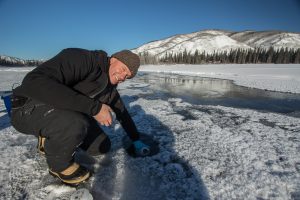Environmental DNA (eDNA) Theory and Implementation
- Start Date: October 23, 2024
- End Date: October 24, 2024
- Time: 9am - 4pm
- City: Revelstoke BC
- Venue: Okanagan College: 1401 1 St W, Revelstoke, BC V0E 2S0
- Instructor: Jared Hobbs
Course description

Environmental DNA (eDNA) is a proven and globally accepted method that is increasingly being used for survey of aquatic taxa. This highly effective, cost-efficient, and non-invasive method relies on the detection of genetic materials in aquatic ecosystems using laboratory analysis of water samples to detect DNA from the target taxa. Environmental DNA methods are predicated on basic biological principles and employ long-standing proven methods for laboratory testing. Quantitative polymerase chain reaction (qPCR) is the preferred method for detecting DNA in water samples as it provides an effective way to amplify, detect and identify existing DNA in sample water collected from natural aquatic systems.
Day One: we will provide background on eDNA methods, including theory and lessons to inform practical applications. At the end of day one participants will have a thorough understanding of the principles, and theory, inherent to standard eDNA applications. We will also review lab practices to ensure thorough understanding of all aspects of eDNA, from sample collection through to lab analysis and interpretation of lab results.
Day Two: we will extend the training to add an outdoor component. A local creek and/or wetland will be used as a ‘test’ sample location. This will allow participants to take part, actively, in sample collection as we discuss various considerations pertinent to efficient collection of eDNA samples. We’ll also cover methods to interpret eDNA results (from the lab) and efficient and accurate budgeting for any eDNA project.
Course objectives
- Identify limitations and advantages of eDNA, including its use relative to conventional survey methods;
- Recognize opportunities where eDNA methods may confer efficiencies, in time and cost, relative to conventional methods;
- Design and conduct an eDNA study and be familiar with field sampling methods and protocol to ensure successful project delivery;
- Identify procedural requirements for safe handling, transport and storage of eDNA samples;
- Identify and meet project requirements, from ‘cradle-to-grave’, including considerations for primer development, sample design, project budgeting, implementation, and reporting;
- Develop appropriate field skills for practical implementation of eDNA sample collection requirements in both lotic and lentic environments;
- Develop an understanding of minimum critical reporting requirements to ensure accuracy and transparency during the reporting phase of any eDNA project.
Who is this course for?
This course is for anyone attempting to implement the eDNA methods. There are abundant opportunities to err, this course will help you to overcome common stumbling blocks and ineffeciencies. In the past, these groups have bennefited from this training:
- Pracicing Qualified Environmental Professionals (QEPs) that want to on-board eDNA methods into their standard practices.
- New eDNA practitioners and students
- Regulators contracting eDNA services from QEPs that want to ensure applicants are well-qualified
- Resource managers wanting to better understand how to interpret eDNA results (and ensure integrity during application) for implementation of their own core practice requirements
Our instructor
 Jared Hobbs is a professional biologist with over 30 years of applied experience designing and leading species assessment and conservation projects at both the local and provincial scale. Since 2014, he has been applying environmental DNA (eDNA) methods into his standard practices, leading, or supporting delivery of over 80 eDNA projects in BC, Alberta, the Northwest Territories and Yukon. Initially his eDNA projects were focused on Species-at-Risk; more recently his focus has expanded to also include projects focused on fish and invasive species. Jared is the lead author of the BC MOE RISC standards (accepted in 2017), providing detailed instruction on protocol for field collection of samples from lentic and lotic systems. Jared continues to work collaboratively with the University of Victoria genetics lab (Dr. Caren Helbing) and Bureau Veritas Labs (BVL) to develop and refine eDNA laboratory methods with recognition and funding grants secured (through Genome BC: BC Ignite) to support further advance of eDNA analytical methods.
Jared Hobbs is a professional biologist with over 30 years of applied experience designing and leading species assessment and conservation projects at both the local and provincial scale. Since 2014, he has been applying environmental DNA (eDNA) methods into his standard practices, leading, or supporting delivery of over 80 eDNA projects in BC, Alberta, the Northwest Territories and Yukon. Initially his eDNA projects were focused on Species-at-Risk; more recently his focus has expanded to also include projects focused on fish and invasive species. Jared is the lead author of the BC MOE RISC standards (accepted in 2017), providing detailed instruction on protocol for field collection of samples from lentic and lotic systems. Jared continues to work collaboratively with the University of Victoria genetics lab (Dr. Caren Helbing) and Bureau Veritas Labs (BVL) to develop and refine eDNA laboratory methods with recognition and funding grants secured (through Genome BC: BC Ignite) to support further advance of eDNA analytical methods.
Jared co-authored a published paper on eDNA lab practices, three species-focused case studies (on Rocky Mountain tailed frog, coastal tailed frog and sharp-tailed snake) and a recent white paper for Canadian Standards Association (CSA) to promote development and adoption of standards in eDNA applications throughout Canada. In 2021, he also co-authored a national eDNA reporting standard for CSA. As a natural extension of this work he continues to provide training and support, to practitioners, to ensure rigour during adoption of eDNA methods by other environmental professionals.
Preparation and what to bring
Registrants are required to bring:
- Appropriate and clean clothing and footwear for wet field sites
- A water bottle and lunch if not ordering the optional bagged lunches
What is included with the course?
- Course workbook in digital format to compliment hands-in experience and handy resource for after completion of the course
- MSExcel eDNA specific data-capture template to be used for data entry during filtration
- Certificate of completion will be provided to assist in claming professional development credits
Registration
Registration for this course will include catered breaks and an option to add a bagged lunch for day 2. Lunches and all catering supplied by La Baguette.
*CMI memberships may be purchased upon registration – read more about CMI membership here.
Registration now closed. Contact Hailey for late registraton inquiries: office@cmiae.org
Where to stay?
We have two accommidation options that offer discounts to CMI registrants:
Grizz Hotel: Affordable, right downtown Revelstoke.
- Discount of 10% off seasonal room rates, must phone to book, asking for the “CMI rate.” Phone number: 250-837-5151
- About a 15-20min walk to the School District 19 admin building where this course starts each day
- Suggest requesting a room on second floor to avoid possible street-level noise
Basecamp Revelstoke: various locations and room rates
- Discount code of 15% via the online booking tool using the promo code “CMI”
- Basecamp Resort: Just outside of town towards Revelstoke dam. About a 15min drive to the School District 19 (SD19) admin building where this course starts each day
- Basecamp Suites: A brand new build downtown Revelstoke, about a 10min walk or 5min drive to the SD19 admin building
- Northwinds Hotel: A newly acquired hotel in the Farwell area of town, about a 25min walk to the SD19 admin building

